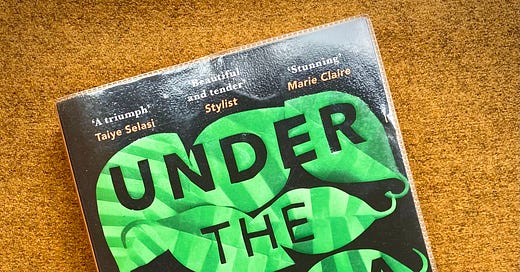Set in Eastern Nigeria from the 1960s to 2014, Under The Udala Trees tells Ijeoma’s coming-of-age story, a huge part of which is her sexuality that she has to hide because it is considered an abomination. It’s the author’s second book, published in 2016.
“There is no way to tell the story of what happened with Amina without first telling the story of Mama’s sending me off. Likewise, there is no way to tell the story of Mama’s sending me off without also telling of Papa’s refusal to go to the bunker. Without his refusal, the sending away might have never occurred, and if the sending away had not occurred, then I might never have met Amina.”
Greetings, dear reader! 👋🏽
I hope you are doing well and taking good care of yourself.
Welcome to another edition of this spectacular newsletter.
The year is 1968 and it’s the second year of the Nigerian Civil War, and Ijeoma’s father has just died. He refused to hide in their bunker during a raid. Unable to care for her any longer, her mother sends her to Nnewi to live with her father’s friend, the grammar school teacher, and his wife. She was going to help them around the house and they would look after her and send her to school.
During one of her errands for her guardian, Ijeoma meets Amina, a girl about the same age as her, who had lost her entire family. She had noticed that she looked at girls a little differently but with Amina, she feels an instant connection. Ijeoma takes Amina home. After a bout of questioning, the grammar school teacher and his wife agree to let her stay with them and do chores with Ijeoma.
Everything is going smoothly until the grammar school teacher walks in on Amina and Ijeoma rolling in the sheets. Ijeoma’s mother, who she hadn’t seen in nearly two years, is summoned and after the meeting, she leaves with Ijeoma.
Back in Aba, where Ijeoma’s mother had moved after she sent Ijeoma to Nnewi, they began to have daily Bible studies. Her mother was determined to prove to her that that was not the way God intended it to be. Nwoke na nwunye. Man and wife. Adam na Eve.
Asking one day to check if the lessons had achieved the desired effect and Ijeoma’s reply proved otherwise, her mother descended into a frenzy. She was bent on driving out the demon that had possessed her daughter and made her like women the way she should like men.
“I could have prayed at this point. I did want to pray, even, if prayer would be what would calm things down. But my mind could not think up the words to begin. All of her screaming, all of her orders, were instead replaying themselves inside my head.”
When the war ends and normalcy gradually returns, it’s time for Ijeoma to go to school. Despite the sour turn of events during her time at the grammar school teacher’s house, he still holds up his end of the bargain and sends her to school. He also sends Amina to the same school.
At first, Amina avoids Ijeoma like the plague but they eventually find their way to each other and easily fall into the habit of spending all their free time together… like old times. Amina had a dream one day and that was the beginning of the end of their relationship. The Bible lessons got to her after all. They finish their time at the school as strangers and at the end, Amina declares she’s getting married.
“It was certainly friendship too, this intimate companionship with someone who knew me in a way that no one else did: it was a heightened state of friendship. Maybe it was also a bit of infatuation. But what I knew for sure was that it was also love. A deeply felt affection accompanied by a certain sort of awe. And by gratitude. And by a desire for a lifetime of togetherness.”
Ijeoma goes back to living with her mother and in no time, she meets Ndidi, the only other person she ever loved. It is, however, a love that can not be openly displayed so she ends up marrying her childhood friend but for how long could she live a lie?
Ijeoma’s story, written in first person, is a deep and rather heavy one. Not heavy as in the case of grief but in a way that leaves you asking many questions and wondering about several matters. It may take a few chapters to get into the story because the writing style is unusual but it’s a powerful story nonetheless.
The author explores societal pressures and the dangers of living your life as you prefer. The average Nigerian struggles with their identity, constantly bending this way and that to adjust to harsh realities and the concept of what is acceptable and that which is taboo. Enter religion and other stories. The story ends with an offer of hope that I sadly do not share because…Nigeria but oh well.
Have you read this book? What did you think about it? Kindly leave a comment.
If you read this book after reading this review, come back and share 😊
#51: Who Is In The Garden?
The Garden follows Lęina on her journey in search of her mother, Yuliana, who had disappeared 15 years prior. Armed with her mother’s journal and a local tour guide’s help, she sets out to find the mythical garden that had held her mother captive.





